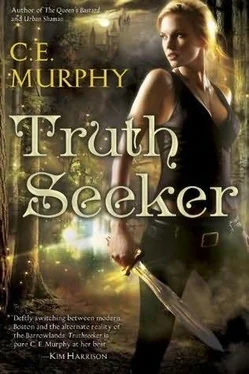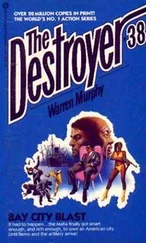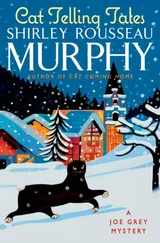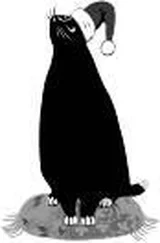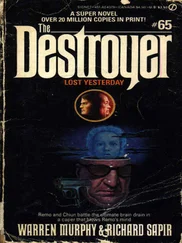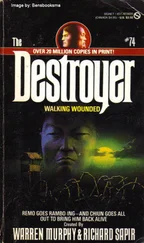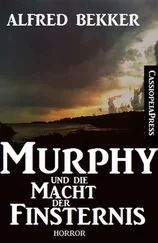Lara’s eyebrows shot up, her distress wiped away by Dafydd’s sheer pomposity. He pursed his lips, clearly judging what he’d said by her terms, and amusement creased his features as it had moments earlier when the king had been equally haughty. The impulse to tease him rose, then faded again: she was there to fulfill a duty she’d agreed to. “Dafydd, there ha—”
Another gasp rushed around the hall and Lara’s gaze went to the gathered courtiers, her eyebrows wrinkled in confusion before exasperated comprehension swept her. She’d breached protocol by using his name so casually. Well, the Seelie court would have to adapt: she wasn’t, despite an outward similarity, one of them. “There must be a thousand people in this room, Dafydd. There’s no way I can tell if a handful of them don’t answer, and if they don’t, there’s no truth or lie to sense.”
“A compulsion can be laid,” he offered. “One that will oblige speech, though it cannot force the truth.”
Lara’s eyebrows shot upward. “I take it you don’t have a Fifth Amendment. You can—” She turned away from the throne—turned her back on the king, eliciting yet another shocked intake of breath around the room—and put her fists on her hips. Only Dafydd, she thought, would see how her nails bit into her palms: how she used the bold stance to hide her own worry. “And you’d let him?” she demanded of the court at large. “You’d let him compel you to speak?”
“He is our prince,” Aerin said into a silence no one else seemed willing to break. “We have nothing to hide from him. Of course we’ll allow it.”
Lara, loudly enough to hear in the quiet of the courtroom, muttered, “You really aren’t human,” and turned back to Dafydd. “All right. If that’s acceptable within your justice system, it’s all right with me. But if it’s not someone here, what are we going to do about the rest of the Barrow-lands?”
Another smile spilled over Dafydd’s face. “We’ll cross that bridge when we come to it.”
Elves obviously didn’t say “we’ll cross that bridge when we come to it”: a rumble of comprehending bemusement rolled through the court before their prince began murmured words of enchantment. As when Aerin scolded Myfanwy, the sense of his words became clear to Lara. Then recognition leapt in her: it was the same tongue Dafydd had spoken in the fight with the nightwings, and she hadn’t understood it at all, then. A few hours in the Barrow-lands had changed her, had deepened her talent already. Lara folded her arms around herself, warding off a cold that came from within. A murder investigation might take days. By the end of that time, she wasn’t sure she’d recognize herself as the same woman who’d walked through a portal torn in the air.
Though, truthfully, she had already stepped so far beyond her customary boundaries as to be unrecognizable. I contain multitudes , she thought, and wondered if the poet who had written those words had ever found himself torn between worlds and choices.
Dafydd’s incantation ended and the court gave a collective sigh, their attention turning to Lara again. She tightened her arms around her ribs, then imagined how fragile and afraid she must look, huddled like that. It was the stance of a woman who didn’t want to be noticed, but she’d come here to offer help. She straightened, taking a breath deep enough to strain her tight-woven bodice, and met the eyes of those closest to her.
Light eyes: they all had light eyes, water blue to golden hazel and clear green, but none of them even close to the brown of her own. Lara stared from face to face for a few seconds, taken aback by uniformly translucent skin, pale hair, and eyes without a hint of darkness to them. For an instant their willowy forms and high-cheekboned faces looked not ethereal but inbred. Nowhere on earth could she imagine corralling a thousand passersby from any handful of streets in that city and finding such an unbroken similarity from one face to another.
They were dying, she thought very clearly, then threw the idea off with a shudder. “Is there a way to test if the compulsion is working?”
Dafydd made a nonplussed sound. “You’ll have to trust me. Or ask everyone individually if they’re obliged to answer, in which case we may as well have not bothered.”
“Fair enough.” Lara backed up until her heels touched the first step of the throne dais, then stood on her toes. “I wish I could see you all. All right. I think I’m going to have to ask a lot of very similar questions to cover all the bases, so I’ll start with … did anyone here murder Merrick ap Annwn?”
She braced for a tide of answers similar to the thanks offered moments before, but was instead greeted with a thousand chimes, like single notes struck from distant triangles. They lifted her, played at her skin and the fine hairs at her nape, making her tremble with their music and taking her weight from her feet. “No,” she whispered back into the purity of their response. “No one here murdered him.”
A sigh of relief tempered with concern washed over the court. Lara felt a stab of sympathy. It would have been easier if one false note had played; if one person had come up untrue and therefore offered an end to their uncertainty. At the same time, the truth reverberating in their answers meant none of their friends was guilty of murder, and that was soothing, too. Lara bit her lower lip. “Is anyone here responsible, in any way, for Merrick ap Annwn’s death?”
Sour notes echoed in the court’s response. Lara pressed her fingers against the sides of her nose and bared her teeth behind the steeple of her hands. “That was an awkward question. Let me try this: Does anyone here feel guilt over his death?”
Pure tones rang out in disparate answers: hundreds upon hundreds answered no , truthfully, but a handful more said yes with as much truth. Glances were exchanged, frowns and sharp looks, and in a few places the courtiers shifted, making distrustful space around those who had answered in the affirmative.
Lara nodded, lifting a hand as though she conducted music. “Will those of you who said yes please answer this next question, and the rest remain silent: Why do you feel guilty over Merrick ap Annwn’s death?” Repeating his full name felt necessary, like anything less might allow the men and women she interrogated to squeak by with a truthful answer that didn’t address what Lara wanted to ask. Her heartbeat was sick and fast in her chest, full of worry that she might let something slip by unnoticed. She was a tailor, not a lawyer.
Answers flooded back, more than one word this time, many of them mumbled with shame. I didn’t like him , or I wished him ill; I wanted him out of our court —all true answers. Dafydd stood rigid with tension at Lara’s side, his gaze lingering on those who responded truly with an answer he didn’t like. He looked betrayed, Lara thought, as though those who hadn’t liked Merrick struck at him personally with their distaste.
Lara nodded again, more to encourage herself than the court. “The same group, please answer this: Do you believe your feelings may have created a situation that led to Merrick ap Annwn’s death?”
Some did, or were, on further questioning, afraid they might have. The spaces around them grew, their comrades distancing themselves from association with possible murder. Those who stood abandoned did so with grim pride, their eyes warning that such slights would not go unforgotten.
Lara put her teeth together, searching for the right questions to ask: Were those fears rational? Fear wasn’t, by its nature, rational, but most people could separate out a fear of heights from the conviction that the bridge they crossed was going to fall into the water below. Finally satisfied that it was, indeed, fear driving guilt and dissonant answers, Lara brought her questions back to the whole: Does anyone know who is responsible for Merrick ap Annwn’s murder? Does anyone have suspicions? Motives? That got a bitter laugh, and one clear voice out of hundreds: “He was Unseelie.”
Читать дальше
